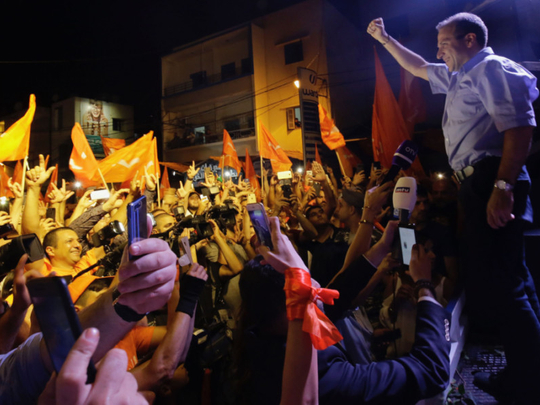
Dubai: The results of Lebanon’s elections show that the country has become more polarised between pro- and anti-Hezbollah forces. While Hezbollah and its allies secured more than half of the parliamentary seats, anti-Hezbollah groups such as the Lebanese Forces headed by powerful Christian leader Samir Geagea gained seats.
Moderates like current prime minister Sa’ad Hariri — who have worked to maintain a delicate balance between Lebanon’s various sectarian and political groups — have lost seats.
What is worrisome about the vote is that Hezbollah and its allies appear set to take at least 47 seats in the 128-seat parliament, which would enable them to veto any law the movement opposes.
Lebanese columnist Nicholas Nassif told Gulf News that the vote reflected changes within political groups and have less of an impact on the overall political system.
Within the Christian groups, Lebanese Forces have gained the most seats while within the Muslim groups the Shiites have out-voted the Sunnis.
Hariri announced yesterday that his Sunni-dominated political movement had lost a third of its seats in parliament.
Optimism
The preliminary results credit his Future Movement with 21 of the parliament’s 128 seats, a drop from the 33 it controlled in the outgoing legislature.
The prime minister admitted that he had hoped for a stronger showing, but said he remained happy with the result despite the gains made by the rival camp led by the Shiite group Hezbollah.
The Future Movement “has been given a large bloc of 21 lawmakers in parliament,” a relaxed-looking Hariri told a large group of local and foreign journalists at his Beirut residence.
“We were betting on a better result and a wider bloc with better Christian and Shiite participation,” he said.
Hariri went on to say, “My hand is extended to every Lebanese who participated in the elections to preserve stability and create jobs.”
Secure for now
The prime minister still heads the largest parliamentary bloc and will likely form a new national unity Cabinet.
He says he will continue to work closely with President Michel Aoun, who is allied with a rival bloc led by the militant Hezbollah.
Turnout stood at a lowly 49 per cent, according to official figures released after Sunday’s vote by the interior ministry.
Hariri, and other senior politicians, blamed the unexpectedly weak turnout on a new electoral law which appears to have confused or disappointed voters.
“The problem with this election: a lot of people didn’t understand it,” he said when asked about the turnout.












